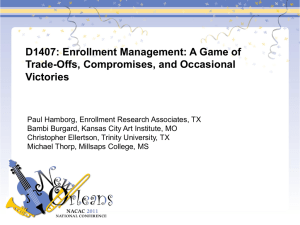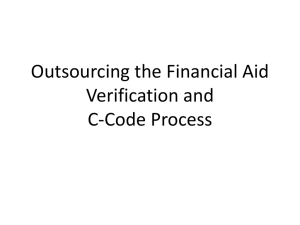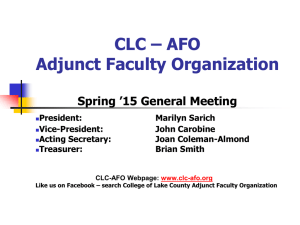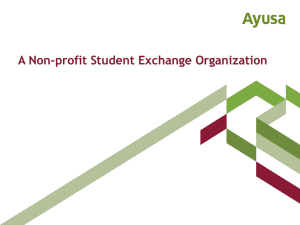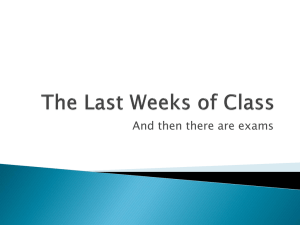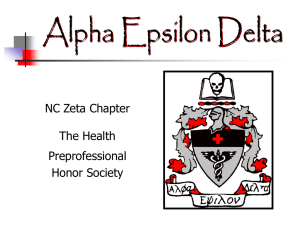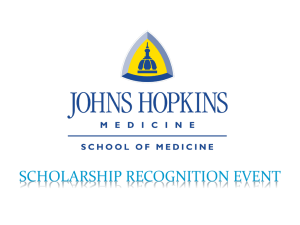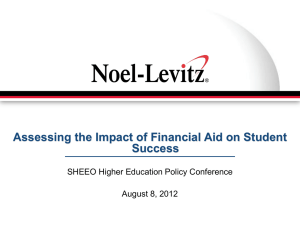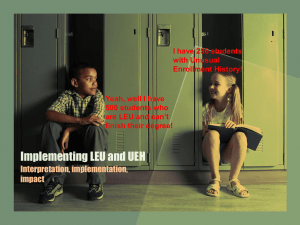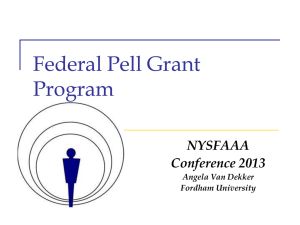New Student Orientation - Southern Crescent Technical College
advertisement
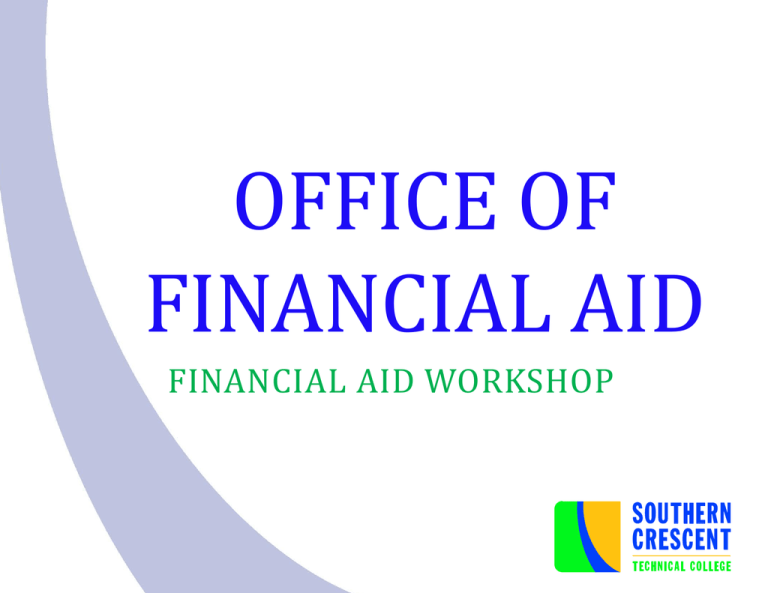
OFFICE OF FINANCIAL AID FINANCIAL AID WORKSHOP FINANCIAL AID WORKSHOP Students receiving financial aid are responsible for understanding and adhering to all policies and procedures as outlined by the State of Georgia, the Federal Governments and Southern Crescent Technical College. (Please refer to our Student Handbook, SCTC Website or contact the Office of Financial Aid). FINANCIAL AID WORKSHOP TYPES OF AID Types of Financial Aid • Scholarships • HOPE Scholarship • HOPE Grant • Pell • Federal Work Study • More information at www.sctech.edu FINANCIAL AID WORKSHOP SCHOLARSHIPS The Southern Crescent Technical College Foundation, Inc. offers scholarship opportunities to students. Click the link to access available scholarships: http://www.sctech.edu/student/grants.php. Kristen Miller Director, Institutional Advancement Southern Crescent Technical College 770.229.3417 FINANCIAL AID WORKSHOP HOPE ELIGIBILITY • • • • • • • Be enrolled as a degree-seeking (scholarship) or diploma or certificate (grant) student at an eligible public or private college or university or technical college in Georgia. Meet HOPE's Georgia residency requirements. Meet HOPE's U.S. citizenship or eligible non-citizen requirements. Be in compliance with Selective Service registration requirements. Be in compliance with the Georgia Drug-Free Postsecondary Education Act of 1990. A student may be ineligible for HOPE payment if he or she has been convicted for committing certain felony offenses involving marijuana, controlled substances, or dangerous drugs. Not be in default or owe a refund on a student financial aid program. Maintain satisfactory academic progress as defined by college FINANCIAL AID WORKSHOP HOPE SCHOLARSHIP • HOPE will pay $62.57 per credit hour • Students with a Bachelor’s Degree or higher do not qualify for HOPE Scholarship • GPA requirement of 3.0 at 30 and 60 semester hour checkpoint. • Dual enrollment hours will not count in checkpoint calculation • Learning support courses will count in checkpoint calculation • HOPE Scholarship will not pay for learning support courses FINANCIAL AID WORKSHOP HOPE SCHOLARSHIP • Scholarship is capped at 127 semester hours • Student must meet Georgia residency requirements for 24 consecutive months • Students may regain eligibility ONLY ONCE after losing the Scholarship • Beginning July 1, 2011, first time recipients must use the HOPE scholarship within 7 years of graduating high school or completing their GED • Students must submit official transcripts from ALL colleges attended AND a HOPE scholarship evaluation form to be considered FINANCIAL AID WORKSHOP HOPE GRANTS Georgia's HOPE Grant (a separate program from the HOPE Scholarship) is available to residents of Georgia who are attending eligible colleges or universities in Georgia to earn a certificate or diploma regardless of high school graduation date or grade point average. • Grant is capped at 63 semester hours; or a combination of HOPE Scholarship, HOPE Grant, Zell Miller, and Accel program funds totaling 127 semester hours • Student must meet Georgia residency requirements for 24 consecutive months • Students may regain eligibility ONLY ONCE after losing the Scholarship FINANCIAL AID WORKSHOP HOPE GRANT • HOPE will pay $62.57 per credit hour • Students with a Bachelor’s Degree or higher do not qualify for HOPE Grant • GPA requirement of 2.0 at 30 and 60 semester hour checkpoint. • Only hours paid by HOPE will count toward checkpoint GPA and hours. • Dual enrollment and learning support courses will NOT in checkpoint calculation • HOPE Grant will pay for learning support courses FINANCIAL AID WORKSHOP HOPE SCHOLARSHIP/GRANT Award Amounts Example Student registers for 12 credit hours in a diploma program. School charges student $1,020 in tuition ($85 per credit hour) and $206 in fees. Total $1,276. HOPE pays $62.57 * 12 Credit Hours = $750.84 (HOPE pays) Student owes $526.16 FINANCIAL AID WORKSHOP PELL GRANT Federal Pell Grants are awarded to students on the basis of financial need. A Federal Pell Grant, unlike a loan, does not have to be repaid. Generally, Pell Grants are only awarded to undergraduate students who have not yet earned a bachelor's or graduate degree. How do I qualify? The U.S. Department of Education uses a standard formula to evaluate the financial information you provide when you apply. You apply with the Free Application for Federal Student Aid (FAFSA). The formula produces an Expected Family Contribution (EFC) number that is based on your family's financial situation -- your Student Aid Report (SAR) contains this number. This number will determine if you're eligible for a Pell Grant and how much you can receive. ALL SCTC Students Should Complete A FAFSA FINANCIAL AID WORKSHOP PELL GRANT All students enrolling for fall 2013 MUST complete a 2013-2014 FAFSA application at www.fafsa.ed.gov to be reviewed for financial aid eligibility (Pell, HOPE, Loans, FWS, etc.) If you are enrolling in the fall 2013 semester, you will need to complete the 2013-2014 FAFSA. ****Important**** We STRONGLY recommended students to use the IRS Data Retrieval Tool when completing the FAFSA online. This automatically imports your IRS Tax data from 2011 into your FAFSA. ******We will no longer accept copies of your Tax Return****** If you are selected for verification, you will have to get a copy of your Tax Transcript DIRECTLY from the IRS, which can take up to 4-6 weeks. This will delay the processing of your financial aid. FINANCIAL AID WORKSHOP PELL GRANT ****Effective July 1, 2012**** A student can receive up to a maximum of 600% Lifetime Eligibility Used (LEU) for Pell Grant. (6 years/12 semesters) Does this affect you? • If you have attended college for 4 years or longer, receiving the Pell Grant each year, you are likely to exhausted or have already exhausted your lifetime limit for 12 semesters of Pell Grant eligibility during the 2013-2014 aid year. • If you have attended college and received the Pell Grant for 3 years or less you will likely not surpass the lifetime limit during the2013-2014 school year. FINANCIAL AID WORKSHOP PELL GRANT Can I see my Lifetime Eligibility Used (LEU)? • You may view your percentage of Pell Grant used by logging into www.nslds.ed.gov. Your LEU percentage will be displayed under the ‘Grants” section. FINANCIAL AID WORKSHOP PELL GRANT How is the percentage used calculated? • The percentage is based on the annual award at the fulltime enrollment status. For students with an annual award for 2011-2012 academic year, attending 12 or more credit hours in each semester (Fall and Spring), the percentage used for the 2011-2012 academic year is 100%. If you only attended 9 credit hours for two semesters, your percentage used for the academic year would be 75%. Will I run out of Pell during the 2013-2014 aid year? • If you enroll full time for both fall and spring (12 credit hours or more), you will use all of your Pell award for the year. • We encourage students to put money aside from their refunds too cover summer tuition, if they plan too attend. FINANCIAL AID WORKSHOP PELL GRANT FINANCIAL AID WORKSHOP FEDERAL WORK-STUDY The Federal Work-Study (FWS) program gives part-time jobs to undergraduate and graduate students with financial need. Under the program, these students can work to make money to pay for their education expenses, including tuition, books, and room and board. • Students work on campus, as well as work that is related to your classes • You'll be making at least the current federal minimum wage. The current pay is $8.00 per hour. • The total amount of your Federal Work-Study award will depend on when you apply, your level of financial need and the funding level of your school. • Students cannot work more than 15 hours a week. Students can work until their awards run out. • Students get paid once a month. • When scheduling your work, your employer or financial aid administrator will look at your class schedule and your academic progress. • Apply online on the Employment page on www.sctech.edu FINANCIAL AID WORKSHOP WITHDRAWALS If you withdraw from one or more courses after the ADD/DROP period, you will receive a grade of W and you may also receive a recalculation on financial aid funds received for that term. Since a calculation is made based on the percentage of the semester you have completed, the Financial Aid Office cannot give you a specific amount upon your inquiry. You may owe a portion of any financial aid received. Withdrawn courses (including Hardship withdrawals) count toward total hours attempted and when determining satisfactory academic progress. Financial Aid does NOT pay for “repeat courses” if the student receives a passing grade of D (if considered passing for a course) or better. FINANCIAL AID WORKSHOP SATISFACTORY ACADEMIC PROGRESS (SAP) Students must maintain a cumulative Grade Point Average (GPA) of 2.0. The GPA is cumulative (includes entire academic history). Students must have a minimum GPA of 2.0 when transferring programs in order to receive financial aid. GRADE QUALITY POINTS (QP) HOURS TOTAL QP A 4 X 3 semester hours 12 B 3 X 3 semester hours 9 C 2 X 5 semester hours 10 31 quality points/9 hours = 3.44 GPA FINANCIAL AID WORKSHOP SATISFACTORY ACADEMIC PROGRESS (SAP) Students must maintain a completion rate of at least 67% in ALL hours attempted in order to receive financial aid. Attempted hours include F’s, I’s IP’s and or W’s. Attempted Withdraw Passed Completion Rate 12 6 6 50% 3 3 0 0% 9 0 9 100% Passed hours Attempted hours Completion rate 22.66 22.66 100% 19.99 32.98 61% FINANCIAL AID WORKSHOP SATISFACTORY ACADEMIC PROGRESS (SAP) Students cannot exceed maximum timeframe. A student may receive financial aid for 150% of the number of semester hours required to earn a degree, diploma or certificate. For example, if a student is enrolled in a diploma program that takes 100 semester hours to complete, that student may receive financial aid (if eligible) for 150 semester hours before financial aid is revoked. FINANCIAL AID WORKSHOP SATISFACTORY ACADEMIC PROGRESS (SAP) What happens if a student fails to meet one or all of the SAP components? Students falling below the SAP guidelines for the first time will be put on Financial Aid Warning. Financial Aid Warning is a warning period only and the student is still eligible for aid. The student will then have one(1) semester to meet SAP standards before being placed on Financial Aid Suspension. Students who are on Financial Aid Suspension are NOT eligible for Financial Aid. Student have the right to appeal their first suspension. FINANCIAL AID WORKSHOP SATISFACTORY ACADEMIC PROGRESS PLAN If the appeal is approved, financial aid is reinstated changing their SAP status to Probation. Students are then placed on a Satisfactory Academic Progress Plan. During the semester that student is on probation, they must maintain a 2.0 GPA, cannot withdrawal from any classes and can only register for courses that are required for their certificate, diploma or degree. The SAP Plan must be signed and returned to the Office of Financial Aid or a hold will be placed on your account until the plan is received. At the end of the semester your progress will be reviewed to make sure you have met the terms of the appeal. If so you will continue on Financial Aid probation, if not you will be placed on suspension without an option to appeal again. You will be required to pay out of pocket until you are back in Financial Aid Good Standing. FINANCIAL AID WORKSHOP STUDENT LOAN PROGRAM Effective Fall semester 2013 Southern Crescent Technical College will no longer participate in the Student Loan Program. FINANCIAL AID WORKSHOP QUESTIONS????? Contact our office at 770-228-7368 or 706-646-6386 or by email at finaid@sctech.edu
